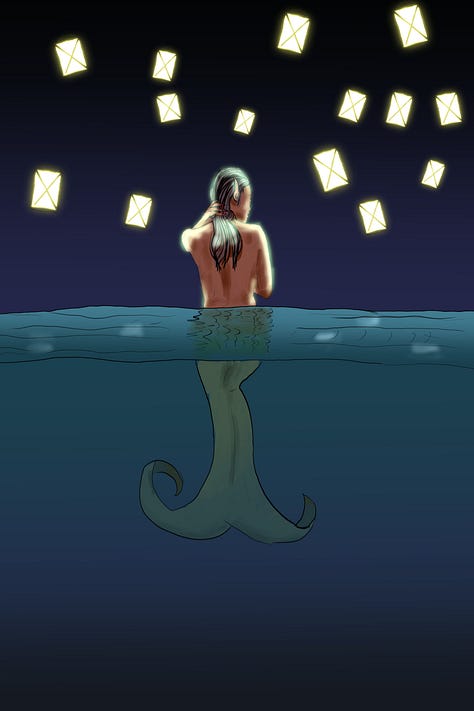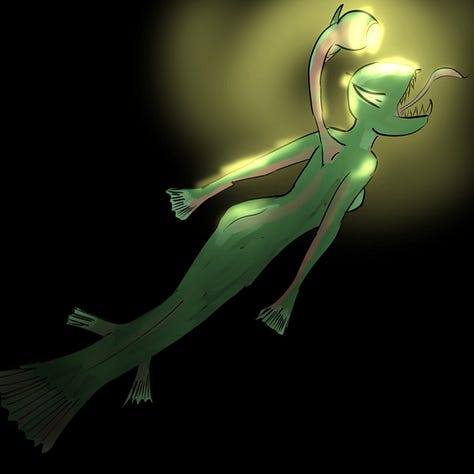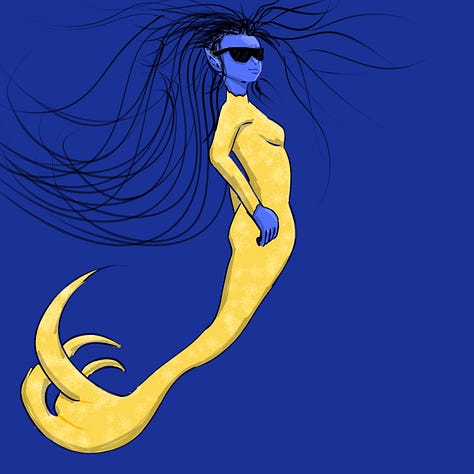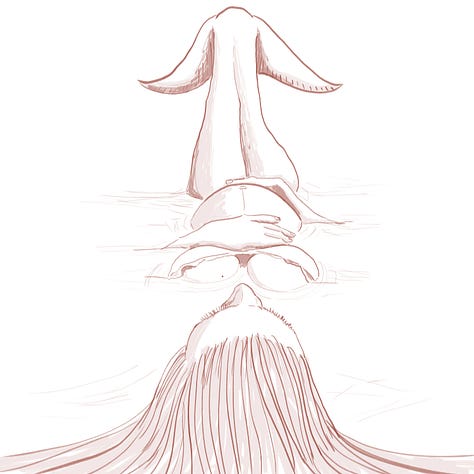The Triverse is
Mid-Earth, an alternate 1970s London
Max-Earth, a vision of the 26th century
Palinor, where magic is real
Previously: Detective Zoltan Kaminski has been investigating a case of fraud. The accused, Stan Lazarus, was a disgraced doctor from a neighboring dimension, known for his experiments in extending life. He’s been arrested and awaits extradition and trial. And yet, here we have part 5, with the story continuing…
Off duty: DC Zoltan Kaminski
London.
1974. April.
The Lazarus case had escalated rapidly, to the point that it was largely out of SDC hands. Kaminski was fine with that, and not having to deal with more rich arseholes shouting at each other. He stood on the steps outside the Joint Council building, smoking a cigarette in the afternoon sun before heading home.
Palinor wanted Lazarus to stand trial for crimes committed over a century ago. Re-opening a cold case from multiple generations prior was one thing; finding out that the suspect was still alive was quite another. Then there was the Max-Earth contingent, a cabal of megacorps and the global Earth government, petitioning to get their hands on Lazarus and his knowledge. Their argument was that his micrology skills could be adapted to Max-Earth’s nanotech and applied to make cost efficiencies to their longevity treatments.
Kaminski somehow doubted that those savings would be passed along to the customer.
Lazarus was more than happy to cut a deal and was pushing to go to Max-Earth. The guy would probably insist on receiving treatments himself in return for his contributions. The whole thing had a bad smell, but it was no longer SDC or police business. The Home Office and Joint Council could wrangle Lazarus’ future.
Cigarette finished, he ground it underfoot, sighed, and started walking to the tram stop. It was a clear day, unseasonably warm, and rains the previous night had left the city unusually sparkly.
There was a shout from behind, Robin’s voice, and she ran to catch up to him. “Zoltan,” she said, out of breath, “you got a message.” She took hold of his hand, which he thought was weird. “It’s from the hospital. It’s your mother.”
Hospitals were the only places in London you weren’t allowed to smoke. As he hurried up to the desk, Kaminski could already feel the need to light up. His hand was in his jacket pocket, curled around the packet, but unable to do anything.
“I’m here for my mother,” he said, “Jan Kaminski.”
The nurse on the front desk nodded and began checking through his notes.
Strip lighting rattled and flickered overhead. The squeak of rubber soles on cheap tiles echoed the corridors. Somewhere a fly buzzed, hunting for carrion. The waiting room was overflowing with disease and injury, the wards full and beds in short supply. British hospitals weren’t what they used to be, and they’d never been great. Kaminski did everything in his power to avoid seeing a doctor, preferring to wait out an illness. Patience was invariably his treatment of choice. That’s probably why he always felt like he was falling apart.
Finally given directions, he hurried down the corridors in search of the correct ward. The pale door gave way to a darkened room with a single bed and a chair in one corner. The blinds were half-closed, with only a bedside lamp for illumination. A man sat on the corner of the bed, which was otherwise empty.
“Tata,” Kaminski said, still by the door.
The older man didn’t respond.
“Where is Mama?”
His father looked up, only then realising he was there. “Zoltan,” he said. “I’m sorry. Your mother’s in surgery. They’re still working on her.”
“What happened?” He took a step into the room.
“Heart attack.” His father’s shoulders slumped even further. “She was making lunch.”
“Where is she now?”
“They said I should wait here.”
Inhaling through his teeth, Kaminski turned on his heel and went back out into the corridor. There were colour-coded lines running the length of the corridor, with red marked for surgery. He followed the paint along the wall and around a corner, the hospital huge and labyrinthine, every part of him telling him to turn back and run, to escape onto the streets and away from the disinfectant and artificial cleanliness.
He found it eventually. A surgical theatre with suspended lights and a gurney upon which was his mother. His view was obscured by the blinds and the gathered doctors, surgeons and nurses inside the room. The door was locked when he tried the handle.
Standing impotently in the corridor, empty other than for the occasional passing of a nurse with a trolley, he tried to think back to his last conversation with her. Had he seen her that morning? Possibly not - he’d been up and out early. The previous evening, then? But she’d gone to bed early, and Kaminski had been at the pub with Clarke and Chakraborty. He couldn’t remember.
The desperation for a cigarette was overwhelming and all-consuming. His mind was caught between whatever was happening in the operating theatre and his craving. There was nothing he could do, there in the corridor. He could go outside, smoke, come back in. Or he could go back to his father. Leaving the theatre window felt like the wrong call.
Stan Lazarus came to his mind. A man who had lived for over a century, seemingly having managed it by abusing his patients for decades while on Palinor. He thought of those rich fuckers with their determination to pay their way to a living elysium. He thought of Justin, an artificial mind that he’d only met in temporary bodies and for whom death was an abstract notion. Max-Earth, with its longevity treatments and advanced medicine, yet for all of its progress still defined by the haves and have-nots.
Perhaps he could get Lazarus there, to the hospital. Combine his Palinese knowledge with the London doctors. Much like had been done for Yvette Field - a girl so horrendously injured she would have died, were it not for those joint efforts. She was back on Mid-Earth now, right as rain. Anywhere else and his mother would certainly live, he was sure of it. It was just that they lived in the wrong place. Even if he could get her to Addis, which had incorporated as much Max-Earth tech as was possible into its healthcare, it might be enough. He could make a call, book tickets on an airship, just like he’d done with Chakraborty. Perhaps he could get Robin to arrange it. Could even put it on expenses and mark it down as a liaison visit to see Detective Birhane. It would be hugely expensive, especially safe transport, but it was possible.
The door to the theatre clicked and opened. A nurse walked out carrying a cloth-covered metal tray and was momentarily startled to find Kaminski hovering outside. “Oh, excuse me,” she said, and tried to walk around him.
“That’s my mother,” Kaminski said, pointing uselessly. “How is she?”
The nurse’s eyes lowered and she stared at his feet for a moment, before returning his gaze. “I’m very sorry, sir,” she said, apologising as if it were her fault, “but the patient passed away during surgery. The doctors tried their best. Again, I’m very sorry. There will be someone along to see you very soon.”
She carried on talking, but there was a thrumming in Kaminski’s ears that stopped him from hearing. His knees felt strange and his head oddly light. He fumbled in his pocket and took out a cigarette. He could hear the nurse protesting as he lit it. Blood returned to his legs and head with its warmth.
He inhaled, then exhaled, and the smoke stung his eyes. It hadn’t done that for years.
Thanks for reading!
Another busy week, trying to juggle daily sketches and writing. Talking of those daily sketches, because we’re still in May it means I’m still drawing mermaids, having committed to ‘Mermay’. It’s been great fun, but I’m looking forward to June.
Here’s a little gallery of some of my recent efforts:






It has been excellent for learning, discovering what I’m bad at, occasionally doing something I was pleased with. Regular creative habits definitely help! Thanks again to
for tipping me off about it.One thing I’ve struggled to focus on is my writing guide. I know every day person has a book about writing, but I couldn’t resist. Besides, this one will focus on my serial technique and why, what and how to write in public. It’ll be a heavily revised and updated version of the Writing Serialised Fiction series I did here a year-or-so back.
I’ve currently given it the working title of Naked Writing. Giving it a title has somehow made it feel a bit more real, so hopefully I’ll make more progress in the coming weeks.
Author notes
RIGHT. Let’s talk about this chapter.
There’s almost no science fiction or fantasy gubbins this week, right? It’s a very down-to-earth story about a man losing a parent. It’s also about healthcare, and how it is so unfairly and unevenly distributed.
If you came here for spaceships or dragons, I do apologise.
Part of what I love about writing Triverse is its breadth. Tonally, thematically, it can go almost anywhere I want. Kaiju monster attack on London? Done that. Gritty murder investigations? Done that. People smuggling? Can tackle that. Institutionalised prejudice? That’s a thing in Triverse. The Met police being untrustworthy and corrupt? Yup. Interplanetary artificial intelligences? Sure!
There is a saying about not being able to have your cake and eat it. Respectfully, I disagree.
But yeah, this one was all about dialling back all of the wackiness and focusing in on a single character and a single voice, and dragging him through a horrible experience. Kaminski losing his family has been on the cards for a while, I just wasn’t sure exactly when or how it was going to happen. When the ‘Immortality’ storyline floated to the top of the pile, it seemed like a good place to go down that road. This entire storyline, after all, has been about life and death and legacy and how we look after one another.
Originally I’d considered having Kaminski’s mum die in part 1 of the storyline, or at least have her be in the hospital, and have that play over and around his dealing with the case. That felt too busy in the end, and probably too manipulative, so I kept it for this coda instead. It was trailed in that first part, of course, with Nisha and Zoltan chatting about his parents. It’s long been established that he was close to them, and was their primary carer, but I felt like it needed a gentle reminder in advance of this development.
It felt like a bit of a risk, having such a stripped-back chapter, but I think the foundation is firm enough with Triverse’s cast by now that it can support such a thing. Do let me know if you agree (or not).
Thanks again for reading, and for supporting.
Photo by Martha Dominguez de Gouveia on Unsplash





Oof. That's rough. That is rough.
Love this chapter and your style. Drawings too. So talented.